#pascal bonitzer
Explore tagged Tumblr posts
Text

Golden Eighties, Chantal Akerman (1986)
#Chantal Akerman#Leora Barish#Jean Gruault#Henry Bean#Pascal Bonitzer#Delphine Seyrig#Myriam Boyer#Fanny Cottençon#Lio#Pascale Salkin#Charles Denner#Jean François Balmer#John Berry#Nicolas Tronc#Nathalie Richard#Simon Reggiani#Gilberto Azevedo#Marc Hérouet#Francine Sandberg#1986#woman director
17 notes
·
View notes
Text




Le tableau volé, 2024, Pascal Bonitzer
8 notes
·
View notes
Text
ADAPTED SCREENPLAY
Shortlisted: The Room Next Door / Small Things Like These / Look Back
THE NOMINEES ARE:

JOSLYN BARNES and RaMELL ROSS, NICKEL BOYS
TURNER I used to think out there is out there, and once you’re in here, you’re in here. But now that I been out and I been brought back, I know. In here and out there are the same, but in here no one has to act fake anymore.

PASCAL BONITZER and CATHERINE BREILLAT, LAST SUMMER
ANNE I know his life’s not been easy. I know he learned to hate me for supposedly stealing his father away. I get that he wants to make us pay, but it’s no excuse. And it doesn’t excuse you!
PIERRE Calm down.
ANNE Don’t touch me! Never touch me again.
PIERRE I just told you what my son said.
ANNE Vile lies, and you swallow them.
PIERRE I don’t know who to believe. Put yourself in my shoes. Imagine the hell I’ve been going through.
ANNE (beat) Your son’s a monster. Get that into your head.

ROBERT EGGERS, NOSFERATU
THOMAS I have... my lord, I have questions about the, um, unfamiliar customs of the peasantry and, um, errant wanderers... Last night, I saw, or rather I believe I saw a band of gypsies... they ventured to a small birch grove, and –
ORLAK Yesternight was but the eve of their Szent András. Our common people say it is the darkest witching night when Devil’s magic bids the wolf to speak with tongues of men, and every nightmare freely treads upon this earth, ascendent from the torturous grave. I fear we yet keep close many superstitions here that may seem backward to a young man of your high learning.
THOMAS These gypsies, they exhumed a corpse.
ORLOK It is their filthy ritual.
THOMAS What manner of ritual –
ORLOK Speak not of it again! (beat) How I look forward to retiring to your city of a modern mind, who knows nothing of... nor believes any such morbid...fairy tales.

JUSTIN KURITZKES, QUEER
LEE I thought of the painted, simpering female impersonators I had seen in a Baltimore night club. Could it be possible that I was one of those subhuman things? I walked the streets in a daze, like a man with a light concussion. I might well have destroyed myself, ending an existence which seemed to offer nothing but grotesque misery and humiliation. Nobler, I thought, to die a man than to live on, a sex monster. It was a wise old queen -- Bobo, we called her -- who taught me that I had a duty to live and to bear my burden proudly for all to see, to conquer prejudice and ignorance and hate with knowledge and sincerity and love. Bobo’s words came back to me from the tomb, the sibilants cracking gently- “No one is ever really alone. You are part of everything that is alive.” The difficulty is to convince someone else he is really part of you, so what the hell? Us parts ought to work together, right?
AND THE CRISTAL GOES TO...

GUILLAUME BRÉAUD, BERTRAND BONELLO, and BENJAMIN CHARBIT, THE BEAST
GABRIELLE I have no idea what you’re talking about.
GINA Yes, this is normal. You’re in a tremendous state of confusion. And you want to know if you will find the man you love again.
GABRIELLE What man? There’s no man.
GINA Isn’t that why you contacted me? You’ve been looking a long time.
GABRIELLE No...I wanted to know if I made the right decision moving out here and...if I have a chance.
GINA You’re far too self-centered. You’re going through a deep narcissistic crisis. It’s very destructive and also very commonplace. It’s ordinary. It’s the great evil of our times, but you must pull out of it.
GABRIELLE (beat) What?
GINA You are a good person, I can see that.
GABRIELLE Why do you say that?
GINA Because I’m scared for you. From what I can see, I’m scared for you.
#2024 Film#Best Adapted Screenplay#The Beast#Nickel Boys#Last Summer#Nosferatu#Queer#Guillaume Bréaud#Bertrand Bonello#Benjamin Charbit#Joslyn Barnes#RaMell Ross#Pascal Bonitzer#Catherine Breillat#Robert Eggers#Justin Kuritzkes
7 notes
·
View notes
Text

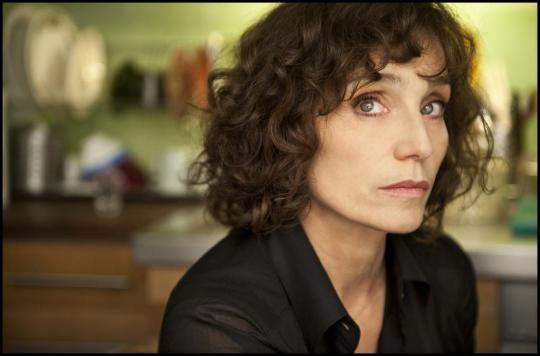
Kristin Scott Thomas as Iva Delusi in Looking For Hortense (Cherchez Hontense) | directed by Pascal Bonitzer | 2012 | France
#kristin scott thomas#looking for hortense#cherchez hortense#french film#french cinema#pascal bonitzer#kst
36 notes
·
View notes
Text
youtube
Le tableau volé réalisé par Pascal Bonitzer, avec Alex Lutz, Léa Drucker, Louise Chevillotte, Nora Hamzawi 😍
Chez moi, Egon Schiele m'a longtemps fixé du regard. Un de ses nombreux autoportraits était reproduit sur l'affiche de l'exposition "Vienne, Naissance d'un siècle, 1880 - 1938" que j'avais accrochée aux murs en 1986. Il nous a suivi lorsqu'on a acheté notre premier appartement avec Gabriel. Depuis qu'on s'est agrandi, comme tout le bazar que j’avais accroché aux murs, il se morfond dans la poussière.

Il y a deux ans, lors d’un week-end à Vienne, j’avais photographié cet autoportrait nu de l’artiste à l’occasion d’une petite exposition à l’Albertina moderne : « Schiele et son héritage ».

Cet été en remontant le Danube en vélo, sans doute ferons nous une halte au modeste musée qui lui est consacré à Tulln an der Donau.
#cinéma#pascal bonitzer#alex lutz#léa drucker#nora hamzawi#egon schiele#les années#autoportrait#nu masculin#vienne#autriche#tulln an der donau#Louise Chevillotte
2 notes
·
View notes
Text

Bonitzer ha elaborato il concetto molto interessante di «disinquadratura» per designare tali punti di vista anomali che non si confondono con una prospettiva obliqua o un angolo paradossale e rinviano a un’altra dimensione dell’immagine.
Gilles Deleuze
6 notes
·
View notes
Text
Il quadro rubato di Pascal Bonitzer
Ispirato a una storia realmente accaduta, “IL QUADRO RUBATO”, in veste di commedia accattivante e intrigante che non trascura la gravità e l’ importanza dei fatti raccontati, narra del ritrovamento del quadrodi Egon Schiele, “I GIRASOLI” disperso nel 1939 nel caos delle spoliazioni naziste e delle distruzioni della cosiddetta “arte degenerata”, e riscoperto miracolosamente anni dopo nella…

View On WordPress
0 notes
Text
VIFF 2023 Review: Last Summer (L'Été Dernier)
Samuel Kircher and Lea Drucker play stepson and stepmother that goes too far in the French film Last Summer. For those that attend film festivals, there are many patrons who hope to catch a film with a bizarre storyline that looks good. One film that attempts to do it is the France film Last Summer. It’s a bizarre story that comes with unexpected twists. Anne is an attorney in family law. She…

View On WordPress
#Bonitzer#Breillat#Canal+#catherine#Cine+#Dernier#Drucker#Film Festival#France#Kaehne#Kircher#L&039;Été#Lea#Louise#Olivier#Pascal#Pyramide International#Rabourdin#Samuel#SBS International#summer#Vancouver
0 notes
Text
'For how can one assign a sex to a being born androgynous?'
'How does a woman live in a man's body, and vice versa?' - Androgynous Parsifal I / II.
"Syberberg divides Parsifal, making a marvelous young girl emerge by dehiscence, whose mouth lets through the voice of tenor. A reciprocal vampirization."

"Marcel Proust opened up new perspectives for me on the confusion of genders. His niece, Suzy Mantes-Proust, gave me access to the archives of her father, Professor Robert Proust. In particular, a file on hermaphroditism in which he was already asking the questions: What is sexuality? What is gender? How does a woman live in a man's body, and vice versa? For how can one assign a sex to a being born androgynous?"
Fernande Gontier: Man or Woman? The Confusion of Sexes
. . .
In Syberberg's film Parsifal, the Wagnerian hero transforms into a woman resembling a Virgin by Dirk Bouts:
Alain Badiou: "The performer of Parsifal is doubled, meaning that it is both a young man and a young woman. Either the addition of sexes or the indifferentiation or hesitation of sexes."
Pascal Bonitzer: "Syberberg divides Parsifal, making a marvelous young girl (Karin Krick) emerge by dehiscence, whose mouth lets through the voice of tenor Reiner Goldberg… A reciprocal vampirization and hand-to-hand struggle, a formidable interpenetration of cinema and opera, of Wagner and Syberberg, of the complex mouth-throat-larynx of the actors and the voices of the singers, of bodies and sets, of depth and surface, of the grand and the small—a stunning fusion of staging with a sublime orchestration…
Parsifal is beyond everything; it is extra-being, yet it is one of the most magnificent things ever to appear on a screen. Here, cinema is invented, surges forth with the force and self-evidence of genius, transforms all the parameters of cinema, traverses the history of film, theater, and painting, brings forth bodies and landscapes in a tension, in a light never seen before, asserts the unreal and the impossible with incredible power, plays with all dimensions, all wanderings, all dislocations of body and face, plays with playback with such genius that direct sound almost seems, by comparison, a petty concern of timid technicians…"
#opera#girl power#transgender rights#lgbtq#music#trans#lgbt#lgbtqia#marcel proust#transgender#androgynous#gender#wagner#richard wagner#classical music#parsifal#proust
14 notes
·
View notes
Photo

C'est fou comme les gens ont de moi cette image de femme sophistiquée, glaciale. C'est une telle erreur, c'est tellement mal me connaître.
- Catherine Deneuve on herself in Belle de Jour (1967)
In anticipation of a new film this summer by Catherine Deneuve called ‘Bernadette’ where she plays Bernadette Chirac, the wife of French Jacques Chirac, I’ve been re-watching some her back catalogue of films. She’s done over 64 films and at almost 80 years old she’s still going strong. And yet out of her many films I’ve always been drawn back to one film which has become a cult classic. Watching it and re-watching it and even gorging on books on its making, new intriguing details reveal themselves about this landmark French art house classic - Belle de Jour (1967).
I once had the privilege of having dinner with her - or rather sat around the same table - through a Parisian host and his lovely wife who had gathered an eclectic group of friends across generations together. I was too self-conscious to talk about her film career directly. I was on surer ground when we indulged in small talk where she was perfectly down to earth and very pleasant. I felt it would be rude to go all fan girl on her and pepper her with questions about Belle de Jour in particular as she’s known to be very ambivalent about her experience of the film - a film that really defined her in the eyes of many people.
But it didn’t mean she didn’t recognise its cultural importance though as she was quite happy to amuse us with a funny story about Belle de Jour. A newly restored 35mm version was funded by the fashion house Saint Laurent back in 2018. Deneuve always had a close relationship with Yves Saint Laurent and also the fashion house. She was the one to introduce Buñuel to Saint Laurent. So the fashion house had a glitzy premiere in New York. But they didn’t count on many of their guests being late. Most of the guests were stuck in the New York traffic and the rain. However Martin Scorsese was the only one to get out of cab and run like a mad man through the pelting rain and huge traffic. A true cinephile, he was so desperate to see the film restored to its former glory that he would go to any lengths to see it.

In Belle de Jour, Catherine Deneuve, whose limpid beauty is capable of sustaining any interpretation, is a perfect Severine and demonstrates a remarkable control in progressing, with enormous economy of gesture and movement, from frigidity to physical warmth as the bored housewife who indulges in part time sex work.
“I felt they showed more of me than they’d said they were going to,” Catherine Deneuve remarked to Pascal Bonitzer in 2004, about the making of Luis Buñuel’s 1967 Belle de jour. “There were moments when I felt totally used. I was very unhappy.”
The story of Séverine, a deeply disenchanted haute bourgeois Paris housewife who finds erotic liberation through byzantine psycho-sexual fantasies and part-time work at an upscale brothel, Belle de jour certainly made extreme demands of Deneuve: her character is flogged, raped, and pelted with muck, among other assaults. But despite her objections to the way she was treated and her difficulties with Buñuel, Deneuve’s performance in Belle de jour turned out to be one of her most iconic.

Deneuve, who had become a star only three years earlier, as the melancholy jeune fille in Jacques Demy’s 1964 all-sung musical The Umbrellas of Cherbourg, was just twenty-three when Belle de jour came out; notably, Buñuel’s film was released in France less than three months after Demy’s radiant, MGM-inspired musical The Young Girls of Rochefort, starring Deneuve and her real-life sister Françoise Dorléac.
But Belle de jour, more than any other film from the first decade of her career, defined what would become one of the actress’s most notorious personae: the exquisite blank slate lost in her own masochistic fantasies and onto whom all sorts of perversions could be projected. (Deneuve as deviant tabula rasa was first seen in Roman Polanski’s 1965 Repulsion, in which she plays a damaged beauty plummeting into psychosis; but Belle de jour doesn’t portray its heroine as mad, instead remaining deliberately ambiguous about the origins of her unconventional desires - and presaging the bizarre libertines she would later play in such films as Marco Ferreri’s Liza, 1972, and Tony Scott’s The Hunger, 1983.)

Buñuel was at a very different stage of his career from his young star, but Belle de jour represented a peak for him as well, the greatest - and most successful - film of his extremely rich late period. These works, bookended by 1964’s Diary of a Chambermaid and 1977’s That Obscure Object of Desire (his final film), were made mostly in France - where Buñuel had begun his filmmaking career with the incendiary, surrealist Un chien andalou (1929) - following the exiled Spanish director’s two decades in Mexico.
Many of these late projects were cowritten with Jean-Claude Carrière and focus intensely on sexual perversion (a theme that recurs throughout Buñuel’s work). Belle de jour certainly falls into that category, and also, typically, skewers the entitled classes. Yet it stands out as the director’s most intricate character study—but of a protagonist who resists definition; the heroine, frequently trussed up and mussed up, retains an odd, opaque dignity in her debauchery.
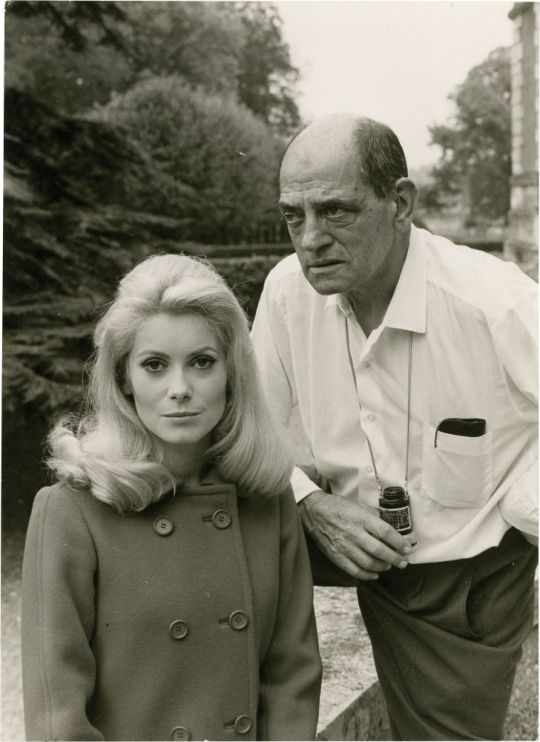
In that same interview with Bonitzer, Deneuve was judicious enough to distinguish her experience of making Belle de jour from the final product, calling it a “wonderful film.” But her first meetings with Buñuel hinted at the duress that was to follow. According to John Baxter’s 1994 biography, Buñuel, it took time for the director to “warm to” his star: “He felt, with some justice, that she had been foisted on him, first by the Hakims [Belle de jour’s producers], then by her lover of the time, François Truffaut.” After dining with Buñuel at his house, the book recounts, Deneuve “left with little more than an impression that he disliked actors in general and was reserving his decision about her. The only advice he offered was the advice he had always given actors: ‘Don’t do anything. And above all, don’t . . . perform.’”
Though Deneuve deferred to her director, she was no puppet; Belle de jour is as much hers as Buñuel’s. The filmmaker, famously resistant to “psychological” interpretations of his work, stuffs Belle de jour with his trademarks, confounding any attempt to parse meaning: the surrealist blurring of fantasy and reality, fetishism, sexual perversion, blasphemy.
But as Séverine, Deneuve, despite operating in the nebulous realm between dream and waking, imbues the film with irresistible and very real lust - and luster. Sporting the chicest Yves Saint Laurent finery, Deneuve revels in the peculiar desires of her character while always inviting our own. As Buñuel himself acknowledges in his 1984 autobiography, My Last Sigh (published a year after his death), Belle de jour “was my biggest commercial success, which I attribute more to the marvelous whores than to my direction.” (Per Baxter, after the filming of Belle de jour, he would finally admit of his star, “She’s really a very good actress.”) Deneuve’s gift was to update the world’s oldest profession for her still-expanding résumé.

The director had some modifying to do as well. Buñuel, who adapted Joseph Kessel’s 1928 novel with Carrière, assessed the source material dryly in My Last Sigh: “The novel is very melodramatic, but well constructed, and it offered me the chance to translate Séverine’s fantasies into pictorial images as well as to draw a serious portrait of a young female bourgeois masochist. I was also able to indulge myself in the faithful description of some interesting sexual perversions.”
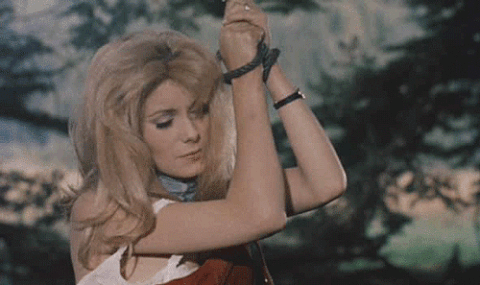
He wastes no time in establishing those bizarre erotic proclivities. In Belle de jour’s opening scene, Séverine and her doting husband of one year, Pierre Serizy (Jean Sorel), a handsome, dutiful surgeon, are snuggled close in a horse-drawn carriage; he interrupts the tender moment with the lament “If only you weren’t so cold.” She pulls away, defensive. The sound of horse bells, which has been increasing in volume from the film’s first shot - and will indicate Séverine’s dreams or fantasies throughout - stops. Pierre orders his wife out of the cab; when she refuses, he and the two drivers remove her by force. She is gagged, bound to a tree, and whipped by the coachmen, who are then instructed by Pierre to rape her. When one begins to ravish her, Séverine appears to be in ecstasy.
This carnal reverie is soon interrupted by the Serizys at home, preparing for their usual chaste bedtime ritual. Pierre, in white pajamas, asks his pale-pink-nightie-clad wife, under the covers in a separate bed, what she’s thinking about: “I was thinking about you . . . and us. We were out for a ride in a carriage”—a scenario Pierre has heard before.

The fantasy clearly belongs to Séverine alone; she finds erotic thrills in her secret thoughts of debasement and humiliation, her florid imagination compensating for her sterile, sexless existence. Her most private desires will soon be realized at 11, cité Jean de Saumur, the address of the boutique bordello run by Madame Anaïs (Geneviève Page), given to Séverine by Pierre’s louche friend Husson (Michel Piccoli).
At Madame Anaïs’s, Séverine - now going by the nom de pute Belle de jour, a reference to her two-to-five shift (she insists on being home when Pierre returns from his workday at the hospital) - is horrified at first but proves to be a quick study. A burly Asian client scares off her two seasoned colleagues with his mysterious, buzzing lacquered box, but she is absolutely transfixed; after the john leaves, she, lying prone on the bed, lifts her head, her luxuriant mane of blonde hair disheveled, to reveal a woman still drunk on orgasmic pleasure.

The contents of the box are one of the film’s many mysteries (when asked what is inside, Buñuel would reply, “Whatever you want there to be”). Yet the greatest enigma is Séverine herself: why does she recoil from the slightest sexual advance from her husband yet lose herself, both in fantasy and in her new line of work, in elaborate masochistic tableaux? “Pierre, it’s your fault too. I can explain everything,” Séverine insists to her husband in the opening fantasy sequence, as she’s being forcibly removed from the landau. But of course, she can’t - and won’t.
As in Repulsion, there are flashbacks to possible childhood trauma in Belle de jour. In one, a man appears to touch a young Séverine inappropriately; in another, she stubbornly refuses the Blessed Sacrament. But unlike in Repulsion, whose final, prolonged shot of a menacing family photo is offered as the root of Carole’s pathology, these scenes in Buñuel’s film are almost non sequiturs, presented not as psychological explanation but as blips in a baroque sexual surrealism.

As Séverine’s reveries and job demands become stranger and more mysterious - in one daydream, she is pelted with thick black mud by Pierre and Husson, who call her “tramp” and “slut”; a ducal client solicits her in the bois de Boulogne to perform in a necrophilic rite - Deneuve retains her porcelain, celestial inscrutability, while simultaneously transforming into an earthbound debauchee, delighting in her own defilement. Madame Anaïs (whose early, shameless flirtation with Séverine - who eventually reciprocates - is the first of the many moments in Deneuve’s filmography that would cement her status as a lesbian icon) touts her new employee’s regal bearing to prospective customers: “[She’s] a little shy, perhaps, but a real aristocrat.”
Séverine’s coworkers, Charlotte (Françoise Fabian) and Mathilde (Maria Latour), are constantly remarking on the impeccable cut and style of her ensembles. Yet what this seemingly untouchable goddess craves most is the brutality of her latest john, the thug Marcel (Pierre Clémenti), a rough with metal teeth, a walking stick that doubles as a shiv, and fetishwear (shiny boots of leather with matching overcoat) that could have been dreamed up in an atelier overseen by Kenneth Anger and Pierre Cardin.
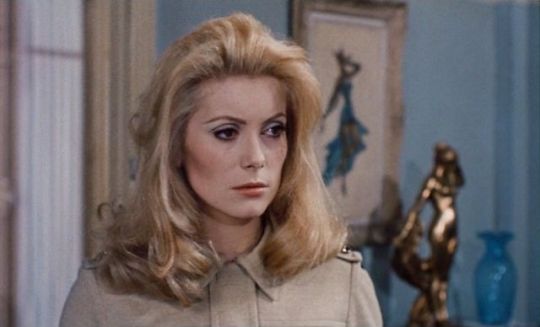
Séverine’s relationship with Marcel will lead to Pierre’s ruin - or does it? The ambiguous ending of Belle de jour suggests that everything that preceded it may have existed only in the heroine’s cracked dreamscape. Like the buzzing box, the film’s final scene is whatever you want it to be.
Yet one thing is certain: Deneuve transcends kink. And despite her misery during the Belle de jour shoot, she would return for even more bizarre treatment three years later in Buñuel’s Tristana, losing both her virtue and a leg.
Almost 55 years after it was made Belle de Jour continues to be a compelling film. It takes on greater curiosity for me as I live in Paris and there are Séverines aplenty that I come across. But the film also speaks to a non-French audience even today as it remains a shrewd commentary on the hypocrisy of social relations and sexual politics. Buñuel invites us to ponder the transgression of a socially respectable woman secretly being a prostitute in the afternoons, but I don’t think he bothered to pose the question why a socially respectable gentleman should be secretly visiting a prostitute in the afternoons - which happens more than one might think and that behaviour is normalised. Something to think about.
#deneuve#catherine deneuve#quote#french#film#movie#cinema#belle de jour#actress#luis bunuel#bunuel#film making#arts#culture#france#scorsese#personal#paris
181 notes
·
View notes
Text
Best Adapted Screenplay
Winner
Last Summer - Catherine Breillat, Pascal Bonitzer, based on the film Queen of Hearts by May el-Toukhy
Who are you? You’re best placed to know. What was the best thing that ever happened to you? Adopting the girls. And the worst? Realizing I couldn’t have children. Your father and I tried desperately hard. Why didn't it work? An abortion, very young. It didn't go well. Wrecked me. Who's your best friend? My sister. Though she's always been jealous of me. And your biggest fear? For everything to disappear, or worse for me to do all I can to make everything disappear. It’s my theory of vertigo. Vertigo isn’t the fear of falling. Its fear of the irrepressible temptation to fall. It's so awful that it's better to jump to stop the fear.
Nominees
The Beast - Bertrand Bonello, Benjamin Charbit, Guillaume Bréaud, based on the novella The Beast in the Jungle by Henry James
Frankly some things are not possible anymore. Such as? As it so happens, the illusion of feeling. The illusion of sentimental self-satisfaction in music. But sentiment is the beginning of emotion. Not necessarily. Emotion can come from somewhere else. Supposing that it were interesting to make music without sentiment, which remains to be seen, what would it be like? Very cold compositions? Not necessarily. It would procure the listener an experience. Not of the classical, primitive. Something that hasn’t been experienced for a long time.
Music - Angela Schanelec, based on the tragedy Oedipus Rex by Sophocles
Another word for "mirror." Six letters. Dream.
Nickel Boys - RaMell Ross, Joslyn Barnes, based on the novel The Nickel Boys by Colson Whitehead
Act above your station and you will pay. Act above your station and you will pay. White lady accused my daddy. Big, cheerful daddy, walking to his second job. I’d just waved to you across the street, going home from school. Said you didn’t get outta her way. Two days later, still waiting to see the judge. Hanged in your cell. God the judge that day. Lord! I ain’t take more than my portion! White man teach me never to ask for more crumbs than he wants to give. Nope, I paid. My daddy paid. My Monty paid. Paid protecting others from paying. Percy paid when he came back. Army don’t protect you here, Percy. Why? Your portion is pain.
Nosferatu - Robert Eggers, based on the film Nosferatu: A Symphony of Horror by Henrik Galeen and the novel Dracula by Bram Stoker
I must know…why me, professor? I am but an able tourist in this occult world, you were born to it. You tell me why. His pull on me is so terrible, so powerful–yet my spirt cannot be evil as his. We must know evil to be able to destroy it, we must discover it within ourselves. And when we have, we must crucify the evil within us, or there is no salvation. I need no salvation. My entire life I have done no ill but heed my nature. Then harken to it. I fear Nosferatu is impervious to any of our iron stakes. I believe only you have the faculty to redeem us. Ellen let us make haste. In heathen times you might have been a great priestess of Isis. Yet, in this strange and modern world your purpose is of greater worth.
Queer - Justin Kuritzkes, based on the novella by William S. Burroughs
A curse…been in our family for generations…the Lees have always been perverts. I shall never forget the unspeakable horror that froze the lymph in my glands–the lymph glands that is, of course–when the baneful word seared my reeling brain: Homosexual. I thought of the painted, simpering female impersonators I had seen in a Baltimore night club. Could it be possible that I was one of those subhuman things? I walked the streets in a daze, like a man with a light concussion. I might well have destroyed myself, ending an existence which seemed to offer nothing but grotesque misery and humiliation. Nobler, I thought, to die a man than to live on, a sex monster.
6 notes
·
View notes
Text
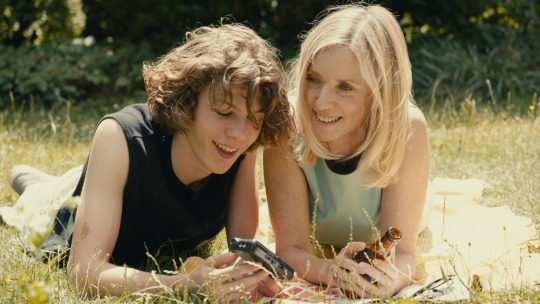
Last Summer (L'été dernier), Catherine Breillat (2023)
#Catherine Breillat#Pascal Bonitzer#Léa Drucker#Samuel Kircher#Olivier Rabourdin#Clotilde Courau#Serena Hu#Angela Chen#Romain Maricau#Jeanne Lapoirie#Kim Gordon#François Quiqueré#2023#woman director
14 notes
·
View notes
Text






Le tableau volé, 2024, Pascal Bonitzer
4 notes
·
View notes
Text
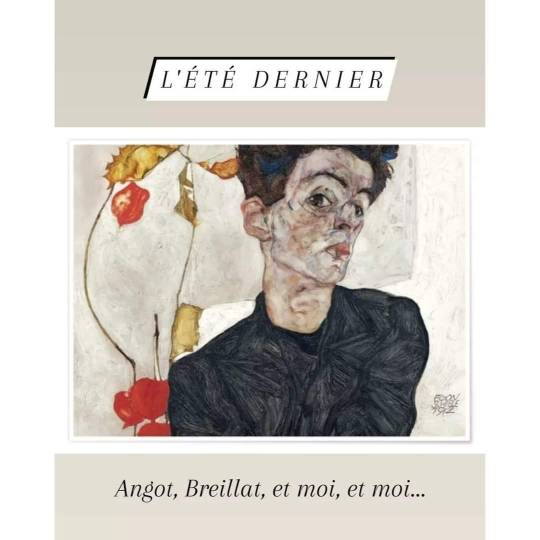
Angot, Breillat, et moi, et moi...
Christine Angot a le mérite de savoir d'où elle parle, et c'est ce qui fait pour moi sa qualité.
Je ne sais pas ce que Catherine Breillat dit sur son film "L'été dernier", et à la limite je m'en fiche. C'est son film qui m'a parlé. Ému. Touché. Dérangé. Bouleversé.
Je suis sans doute l'un des "esthètes" que pointe du doigt C. Angot dans sa "critique" du fim. Oui, sans aucun doute. Et je l'assume.
C. Angot m'intéresse et me touche, mais peut-être parfois mélange-t-elle différentes choses, différents "plans", différents sujets ; le film de C. Breillat n'est pas un film à thèse sur l'inceste, loin de là, pas plus que "Théorème" de Pasolini n'en est un, même si toute la famille - italienne et bourgeoise - finit par coucher avec le même homme (climat incestuel plutôt qu'inceste dans le théorème de P.).
Le film de Breillat ne nous dit pas que c'est bien ou beau de coucher avec son jeune beau-fils. Il montre les choses telles qu'elles sont dans cette histoire-là, dans cette famille-là, la vérité complexe de ces personnages-là, de cette fiction-là. Sans jugement sur l'un ou l'autre des personnages, sans encouragement à les imiter non plus, sous prétexte que l'image serait belle, que la lumière serait belle, car en effet elle irradie !
"Familia Grande" (cité par Angot) parlait de "l'affaire Kouchner" ; il s'agit d'un récit autobiographique avec des personnes impliquées (qui ne sont pas des personnages de fiction), des plaignants, un ou des accusés, des complices.
Je ne crois pas que le scénario de C. Breillat et Pascal Bonitzer ("L'été dernier" est un remake du film danois "Dronningen" réalisé par May el-Toukhy en 2019 et jamais sorti en France), repose sur le témoignage intime d'un homme incesté durant son adolescence. Nous ne sommes pas non plus dans la transposition d'un fait divers à l'écran. Pas plus, dans un autre registre, que pour Médée, Œdipe, Antigone (Antigone n'est pas incestueuse, mais elle est le fruit d'un inceste), ou Phèdre (qui avoue à sa nourrice son amour coupable pour Hippolyte, son beau-fils, fils de Thésée).
D'une certaine manière, le plaidoyer de C. Angot me rappelle la fameuse polémique autour du film de Cyril Collard "Les nuits fauves" ; à l'époque certains lui reprochaient de montrer un personnage qui, se sachant séropo, couchait avec une jeune fille qu'il aimait, sans préservatif et sans qu'elle soit informée de sa séropositivité. Mais depuis quand un film de fiction devrait-il assumer le rôle d'une campagne de prévention ou de sensibilisation ?
Quand Almodovar réalise avec "Parle avec elle" l'un de ses longs-métrages les plus aboutis - Eros et Thanatos dans une chambre d'hôpital, le tout filmé par un cinéaste qui touche avec ce film à la perfection absolue -, je ne me demande pas si cet homme a raison d'avoir une relation sexuelle avec une femme qui est dans le coma. Ça me dérange certes, mais je ne suis ni cet homme, ni cette femme, ni l'un des membres du personnel hospitalier. C'est la vérité de cette histoire et de ces personnages qui m'intéresse.
Connaissant (comme nous tous) son histoire personnelle, je peux comprendre le malaise de C. Angot face au film de C. Breillat ; et son point de vue, sa prise de position, m'intéressent. Elle pique l'esthète en moi à un endroit où, volontiers funambule sur le fil qui relie fond et forme, je pourrais parfois me sentir en déséquilibre. Mais encore une fois, je n'attends pas d'une oeuvre artistique qu'elle s'autocensure dans son propos, dans son processus de création, et quel que soit le sujet dont elle se fait, in fine, l'objet (filmique ici).
Est-ce que la relation du personnage de Léa Drucker avec son jeune beau-fils de dix-sept ans dans "L'été dernier" de Catherine Breillat banalise le climat incestuel, la relation incestueuse ? Je ne le crois pas. Elle nous montre au contraire que le crime (presque) parfait se passe sous nos yeux, dans la chambre d'à côté, et que la vie est ainsi faite qu'elle mérite, en dehors des salles de cinéma j'entends, que nous lui accordions la plus grande vigilance.
Philippe Bresson
2 notes
·
View notes
Text

"Cherchez Hortense" de Pascal Bonitzer (2012) avec Jean-Pierre Bacri, Kristin Scott Thomas, Isabelle Carré, Claude Rich, Jackie Berroyer, Benoît Jacquot, Philippe Duclos et le jeune Marin Orcand Tourres, mai 2025.
0 notes
Text
youtube
L'été dernier réalisé par Catherine Breillat, coécrit avec Pascal Bonitzer, avec Léa Drucker, Samuel Kircher, Olivier Rabourdin... 🙂
De la filmographie de Catherine Breillat, je croyais n'avoir vu que "Romance", mais vérification faite, Rocco Siffredi y jouait et ça, j'aurais dû m'en souvenir. Sa (petite) transgression de faire succomber une femme mûre aux avances du fils de son compagnon, âgé de 17 ans, en ces temps de pudibonderie, m'a plutôt séduit, si ce n'est quelques plans trop longs, notamment pour montrer la femme qui jouit.
Angot qui ne voit pas la différence entre un garçon de 13 ans et de 17 ans, lequel n'est pas, de surcroit le fils de la scandaleuse, y voit une "esthétisation de l'inceste". Qu'est-ce que Christine Angot aurait fait de sa vie sans l'inceste paternel et ce mot qu'elle galvaude ?
Gabriel m'a fait remarquer que la vision des hommes que donne Breillat pourrait être taxée de sexiste : le père du jeune aventurier, vieux lion fatigué, qui ne se serait jamais occupé de son fils jusqu'à ses 17 ans, et un père incestueux aux yeux rougis par l'alcoolisme.
#cinéma#catherine breillat#léa drucker#samuel kircher#olivier rabourdin#pascal bonitzer#intergénérationnel#libido
1 note
·
View note